- Home
- Tom Stoppard
Tom Stoppard Plays 2
Tom Stoppard Plays 2 Read online
TOM STOPPARD
Plays Two
The Dissolution of Dominic Boot
‘M’ is for Moon Among Other Things
If You’re Glad I’ll Be Frank
Albert’s Bridge
Where Are They Now?
Artist Descending a Staircase
The Dog It Was That Died
In the Native State
On ‘Dover Beach’
Introduced by
the Author
CONTENTS
Title Page
Introduction
The Dissolution of Dominic Boot
‘M’ is for Moon Among Other Things
If You’re Glad I’ll Be Frank
Albert’s Bridge
Where Are They Now?
Artist Descending a Staircase
The Dog It Was That Died
In the Native State
On ‘Dover Beach’
About the Author
Also by Tom Stoppard
Copyright
INTRODUCTION
Six of these eight plays for radio were directed by John Tydeman, whom I first met when he was a trainee producer. Now he has just retired from the position of the BBC’s Head of Radio Drama. This collection of all my work to date for ‘Portland Place’ is, therefore, a timely opportunity to pay my respects to a friend who has been a sympathetic and patient collaborator since Radio Three and Four were Third and Home.
The Dissolution of Dominic Boot and ‘M’ is for Moon Among Other Things – reduced to ‘Boot’ and ‘Moon’ in my affections – were written for Just Before Midnight, a series of fifteen-minute plays which went out in 1964. The peg for ‘Boot’ – a man riding around in a taxi trying to raise the money to pay the cabbie – was the first and last self-propelled idea I ever had, and I think I wrote the play in a day. ‘Moon’ started off as a short story which never got into print, and was commissioned, or perhaps only encouraged, on the strength of ‘Boot’.
If You’re Glad I’ll Be Frank (‘Glad/Frank’ ever after) came out of a conversation in a corridor at Portland Place with Richard Imison. John and Richard, Script Editor then and afterwards until his sadly early death last year, represented BBC Radio Drama to me for thirty years. Richard pounced on me Tigger-like with news of a series of short plays about people in imaginary jobs. There and then I proposed the Speaking Clock. I named her Gladys and gave her a propensity towards interior monologue in free verse, so she went out on the Third.
The next play – about a man painting the Forth Bridge solo – may have started life as another candidate for that series, but by this time I wanted to spread my wings and go solo myself; to write without regard to series or given lengths. Albert’s Bridge was my first more-or-less full-scale radio play, and Albert’s interior monologues were longer than Glad’s.
Where Are They Now? was written for Schools Radio. For the occasion I went against my principles, or at least my practice, and dropped a leaky bucket into the well of personal experience. Not that I was taught French by a Welsh sadist – au contraire, remembering kindly Miss Stokes who drove a pre-war Morris coupé – but no doubt many who have been at an English boarding school might suppose we were at the same one.
Artist Descending a Staircase, The Dog It Was That Died and In the Native State were separated by, roughly, ten-year intervals, a matter of circumstance rather than a conscious withdrawal from radio. Even so, ten years is an embarrassing gap for a writer who is enthusiastic for BBC Radio Drama and in debt to it. The existence of these three plays owed itself to John’s and Richard’s persistent letters and postcards. In each case the play grew from nothing other than the accumulating discomfort of failing to deliver.
John Tydeman was the director of ‘Moon’, ‘Glad/Frank’, Where Are They Now? (in its second production; the director for Schools was Dickon Reed), Artist Descending a Staircase, The Dog It Was That Died and In the Native State. ‘Boot’ was directed by Michael Bakewell, and Albert’s Bridge by Charles Lefeaux.
TOM STOPPARD
May 1994
POSTSCRIPT (2012). On ‘Dover Beach’ was written for the actor Alan Howard, one of a series of short plays written for him and broadcast on BBC Radio 4 in 2007.
THE DISSOLUTION OF DOMINIC BOOT
CHARACTERS
DOMINIC
VIVIAN
TAXI DRIVER
SHEPTON
MOTHER
FATHER
GIRL CLERK
MAN CLERK
MISS BLIGH
CARTWRIGHT
Fade in street—traffic.
VIVIAN: Well, thanks for the lunch—oh golly, it’s raining.
DOMINIC: Better run for it.
VIVIAN: Don’t be silly …. (Up) Hey, taxi!
DOMINIC: I say, Viv …
VIVIAN: Come on, you can drop me off. (To driver) Just round the corner, Derby Street Library.
(They get in—taxi drives.)
DOMINIC: Look, Vivian, I haven’t got …
VIVIAN: Dash it—that’s taken about ten shillings out of my two-guinea hairdo—honestly, I’m furious. Don’t you ever have an umbrella?
DOMINIC: Not when it’s raining.
VIVIAN: Didn’t I give you one for your birthday?
DOMINIC: No, it was your birthday.
VIVIAN: Why did I give it to you on my birthday?
DOMINIC: No, it was I who gave it to you on my birthday. Your birthday. Vivian, please stop talking about umbrellas. The thing is …
VIVIAN: If we’re going out tonight, I’ll have to have some repairs on my hair, it’s beginning to straggle. Another pound down the drain.
DOMINIC: I’m afraid I can’t tonight, Vivian, I promised to see my mother.
VIVIAN: What about?
DOMINIC: Um, about my father.
VIVIAN: What about him?
DOMINIC: Nothing. Just keeping her in touch.
VIVIAN: You never see your father.
DOMINIC: Well, we just sort of—talk about him.
VIVIAN: I thought you may be seeing her about us getting married.
DOMINIC: Oh, no.
VIVIAN: What do you mean by that?
DOMINIC: I mean, yes.
VIVIAN: Will we have enough by Christmas, or spring at the latest? After all, you’ve been saving now for months.
DOMINIC: Incidentally, Vivian …
VIVIAN: Oh, no! It’s half-past two—Dominic, we’ll have to start eating somewhere with quicker service. Anyway, I’m fed up with Italian. I don’t know why we always go to Marcello’s, do you?
DOMINIC: No. Only …
VIVIAN: (Up) Just there, next lamppost on the right. (Down) By the way, you’re on the black list—you’ve had those six books overdue for weeks—what do you do with them? (Up) Thank you. (Down) Well, I’ll see you tonight.
(Opens door.)
DOMINIC: I told you …
VIVIAN: Oh yes—tomorrow then, I’ll see you in Marcello’s. Goodbye darling. Oh no, not Marcello’s. Oh, I don’t know—phone me, will you?
DOMINIC: (Slightly desperate) Vivian—
(She’s gone.)
(Thinks:) One and ninepence. Extras sixpence.
(Coin counting:) Sixpence, shilling, one and a penny, one and two, three, threepence halfpenny … threepence halfpenny …
DRIVER: Waiting till the rain stops?
DOMINIC: No, um, the Metropolitan Bank, Blackfriars, please.
Cut. Bank.
DOMINIC: In ones, please.
GIRL CLERK: Oh, Mr Boot, would you mind stepping down to the end of the counter there …
DOMINIC: What for? Oh ah, righto. (Humming.)
(Walking.)
Hello, Mr Honeydew.
SHEPTON: I’m Mr Shepton.
&nbs
p; DOMINIC: Oh really? I thought you were the manager.
SHEPTON: The manager is Mr Bartlett.
DOMINIC: Oh yes, I’m always getting it wrong.
SHEPTON: Well … yes, well, Mr Bartlett has asked me …
DOMINIC: Over the top, am I?
SHEPTON: You’re forty-three pounds beyond your limit, Mr Boot. I’m afraid that we have had to pass back two cheques received today from ah Marsello’s er Markello’s …
DOMINIC: Marchello’s, Mr Sheppard.
SHEPTON: Shepton.
Cut. Taxi moving.
DOMINIC: (Thinks:) Three and three … three and six …
DRIVER: The Irish Widows’ International Bank—is that on the left here?
DOMINIC: No, other side. Thanks. (Thinks:) Three and six, plus six, four bob …
Cut. Bank.
DOMINIC: In ones, please.
CLERK: Oh, good afternoon, Mr Boot. Would you have a word with Mr Honeydew?
Cut. DOMINIC slamming taxi door.
DOMINIC: Co-operative Wool and Synthetic Trust Bank in High Street, Ken, please.
DRIVER: You a bank robber, are you?
DOMINIC: In a modest way. Please hurry, I’ve got to cash a cheque before they close.
(Taxi starts moving.)
Cut to traffic.
DRIVER: I did my best.
DOMINIC: Dammit.
DRIVER: Six and nine.
DOMINIC: Ah, would you mind taking a cheque?
Cut. A door is flung open.
MISS BLIGH: (Very remote, quite detached) Good afternoon, Mr Boot. Mr Cartwright has been asking …
DOMINIC: In a minute—can you lend me ten bob—I’ve got a taxi …
MISS BLIGH: Oh Mr Boot, what a pity you didn’t come earlier. I’ve just spent it all on stamps—five pounds’ worth, Mr Boot.
DOMINIC: Hang on.
(Out door—cross pavement.)
I say, do you take stamps?
DRIVER: Yes, if you like. Green Stamps, are they?
DOMINIC: All colours. I mean they’re stamps. I don’t know what colour they are. Stamps!
DRIVER: Do you mean like for letters?
DOMINIC: That’s right, and parcels. Stamps.
DRIVER: Do me a favour.
(Back across pavement through door.)
DOMINIC: No good …
MISS BLIGH: Oh, what isn’t, Mr Boot? Oh, you’re terribly wet, is it raining?
(DOMINIC through another door.)
DOMINIC: I’m sorry to trouble you, Mr Cartwright…
CARTWRIGHT: I’ve been waiting forty-five minutes to trouble you, Mr Boot. Now look here, I’m going out for the rest of the afternoon, but I want to pick up the Lexington figures to take home, so please have them ready by six. Well, look to it.
DOMINIC: Mr Cartwright—could you lend me ten shillings…
Cut to taxi moving.
DRIVER: Nice area. What number are you?
DOMINIC: Forty-eight. On the left.
DRIVER: You use taxis a lot, don’t you?
DOMINIC: Yes, hardly ever. I mean no, I do …. (thinks:)
Fourteen shillings … and six …
(Taxi pulls up.)
Thanks, I’ll be out in a minute.
DOMINIC: (Panting, muttering) Fourteen and six, fourteen and six … property of the North Thames Gas Board … oh well … where’s that poker … wardrobe, wardrobe—ah!—North Thames, here goes, uh …
(Breaks open gas meter—coins.)
One, two four, five six seven, ten, ten and six, ten and six … oh no, damn … oh God ….
Cut. In taxi—moving.
DOMINIC: First left, second right. Oh, would you like ten bob to be going on with, here.
(Coins.)
DRIVER: You been robbing the gas meter?
DOMINIC: No, no, I just collect them. (Thinks:) Twenty-one and six—plus sixpence, minus ten bob I gave him, minus one and threepence halfpenny, that makes—twenty-two bob, plus sixpence, minus ten bob I gave him.
DRIVER: (Pulling up) Here we are, 73, Mansion Lane.
MOTHER: (On pavement) Taxi!
DOMINIC: Hello, Mother. I was just coming to see you.
MOTHER: Dominic! You always pick the wrong time. Never mind we can talk in the taxi. (To driver) Bond Street.
DOMINIC: Going shopping?
MOTHER: Hair-do. They always ruin it, but I don’t trust anyone else. I’m thinking of going blue. And piled on top. Well, what’s with Vivian?
DOMINIC: A bit straggly—the rain, you know.
MOTHER: What are you talking about? Why are you so wet? Don’t you use Vivian’s umbrella?
DOMINIC: No, why should I? She doesn’t even use the one I gave her.
MOTHER: I mean the one she told me she gave you, for Christmas.
DOMINIC: (Is everyone mad?) She–never–gave–me–an–umbrella!
MOTHER: I like that girl. Have you seen anything of your father?
DOMINIC: No.
MOTHER: I’m told he’s thinking of getting married again.
DOMINIC: Who’d have him?
MOTHER: God knows. I think you ought to go and see him. I think it’s quite wrong not to keep in touch with one’s father.
DOMINIC: Righto. (Thinks:) Twenty-four, minus ten, plus …
MOTHER: And if you find out anything about her, give me a ring at once. Why aren’t you at the office?
DOMINIC: Well, things are a bit slack, and I’m my own boss now really, so I thought I’d take an hour off and have tea with you.
MOTHER: Well, it seems to be the first job you’re any good at. I hope you’re being sensible about it. I bet you’re not saving.
DOMINIC: Oh, I am.
MOTHER: I was getting quite tired of you always coming to see me for money. Good God—twenty-five shillings—Dominic …
DOMINIC: (Trapped) It’s all right—it’s all on the office—I’ve been making some calls for them, you see, old Cartwright….
(Thinks) Oh God ….
Cut—DRIVER driving.
DRIVER: You know who used to cut my mum’s hair? My dad.
DOMINIC: He was a hairdresser, was he?
DRIVER: No, he was a grocer. Corner shop off the Angel.
DOMINIC: (Thinks:) Thirty-one minus ten plus …
DRIVER: And guess who cut his hair. My mum.
DOMINIC: (Thinks:) Thirty-nine, and sixpence for Vivian and sixpence for Mother, minus ten, plus, no minus …. (Up) Can you lend me four pennies?
Cut—DOMINIC dialling—phone.
DOMINIC: (On phone) Hello, Charlie. Dom. Dominic. Is that Charles Monkton? Well, it’s Dom. Dominic Boot. Yes—listen, Charles I’m in a bit of a fix—you know that two pounds I lent you? Yes, now. I’ll come over. Where’s your place? What? I’m not fcoming by train—I’m in a taxi. No, that’s why I’m broke, Charlie—what? All right. Past East Croydon station, first left, 18B. Right.
(Down phone.)
Cut.
DRIVER: You ever been to Croydon?
DOMINIC: No, Why?
DRIVER: It’s over the six-mile limit.
DOMINIC: Limit?
DRIVER: Yes. You see, if you stop me, then I’ve got to take you wherever you want, that’s the law. But if it’s over six miles the meter doesn’t count so I’m allowed to fix a price. That’s the system.
DOMINIC: That’s ridiculous.
DRIVER: Well, I lose on tips, you see. I can take you there, well in that time I can have four other fares and a tip on each. So I’m allowed to strike a bargain with you. Two pounds.
DOMINIC: A pound.
DRIVER: Right, you can pay me off now.
DOMINIC: Twenty-five bob.
DRIVER: Doesn’t pay.
DOMINIC: Thirty with tip.
DRIVER: Thirty-two and six.
DOMINIC: Done!
Cut. In taxi—stationary.
DOMINIC: (Thinks:) Seventy-one in all. Minus ten I gave him. Sixty-one. Three pounds one. One and threepence halfpenny in change. About three pounds, then. Minus two o
f Charlie’s. One pound. Minus, minus nothing. One pound, one pound. Who? Please God, who? Plus fourpence he lent me. One pound and fourpence. Who?
DRIVER: Well have you made up your mind? Can’t sit in Croydon for ever. There’s a fellow there who’s looking like mad for a taxi. Looks like a town fare. If you don’t want to go, say so quick.
(Door opens—DOMINIC in street.)
DOMINIC: Excuse me, you seem to be rather desperate for a taxi.
MAN: I am—I’ve got an important meeting … why?
DOMINIC: I think I can help you. Please take my taxi.
MAN: How very kind of you. Are you sure?
DOMINIC: Certainly. I’m in the business.
MAN: Business?
DOMINIC: I’m a taxi agent. That’ll be twenty-five shillings.
MAN: I’ll call a policeman.
DOMINIC: Very well, one pound and fourpence, and you pay the tip.
Cut—DRIVER driving.
DRIVER: What did that copper want?
DOMINIC: Little misunderstanding. (Thinks:) A hundred and eight, minus ten, minus two pounds … (Up) You must make a fortune.
DRIVER: Shilling a mile I have to give the company for this cab. And there’s my fuel. I’d never keep body and soul together without the shop.
DOMINIC: Grocer’s?
DRIVER: Clothes, furniture, stuff, second-hand. I’ve got a staff. My brother. He cuts my hair. Well, my mum and dad have passed on.
Cut.
DOMINIC: Father! Oh dear Father who art in Windsor …
FATHER: Good Lord, what brings you here?
DOMINIC: Well, I was missing you, Father.
FATHER: Don’t be absurd. Still, good to see you. How’s your mother?
DOMINIC: Very well, Father. Sends you her love.
FATHER: Nonsense. For goodness’ sake sit down. Whisky?
DOMINIC: Fine. Oh, Father, by the way—I’ve got a cab outside …
FATHER: Can’t you even walk ten minutes from the station? You people. (Up) Bates! Give this half crown to the taxi driver and bring us some whisky. Well now, Dominic, how’s the job?
Cut.
DRIVER: Who was that?
DOMINIC: My father.
DRIVER: He seemed angry about something.
DOMINIC: He’d just had some bad news. Derby Street Library, please.
Cut.

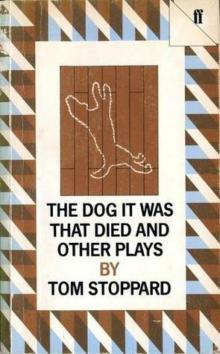 The Dog It Was That Died and Other Plays
The Dog It Was That Died and Other Plays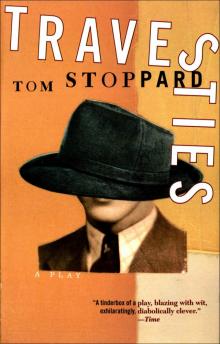 Travesties
Travesties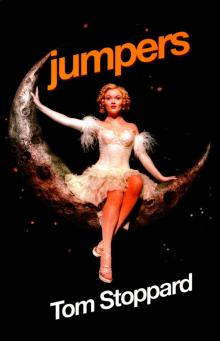 Jumpers
Jumpers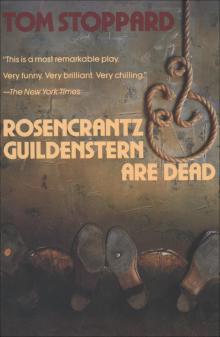 Rosencrantz and Guildenstern Are Dead
Rosencrantz and Guildenstern Are Dead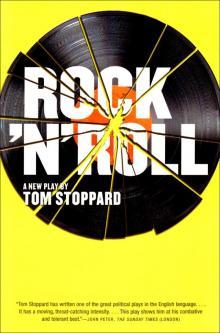 Rock 'N' Roll
Rock 'N' Roll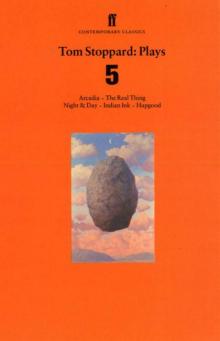 Plays 5
Plays 5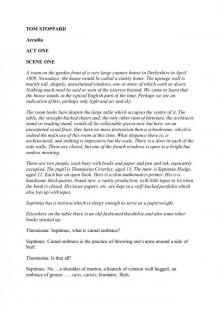 Arcadia
Arcadia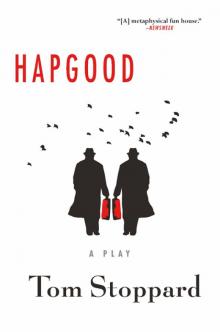 Hapgood
Hapgood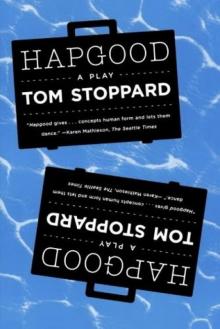 Hapgood: A Play
Hapgood: A Play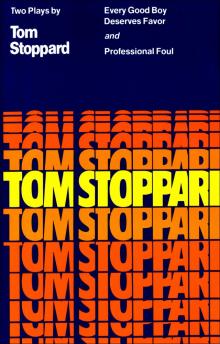 Every Good Boy Deserves Favor & Professional Foul
Every Good Boy Deserves Favor & Professional Foul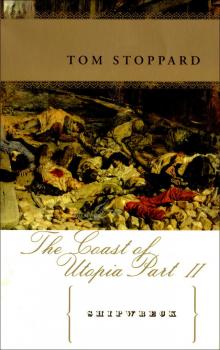 The Coast of Utopia: Voyage, Shipwreck, Salvage
The Coast of Utopia: Voyage, Shipwreck, Salvage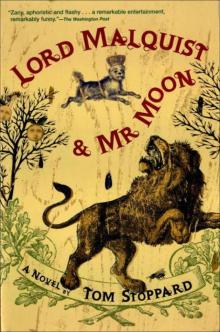 Lord Malquist & Mr. Moon
Lord Malquist & Mr. Moon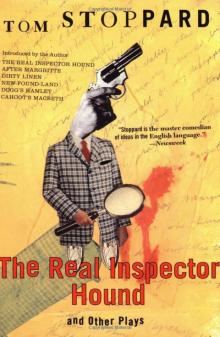 The Real Inspector Hound and Other Plays
The Real Inspector Hound and Other Plays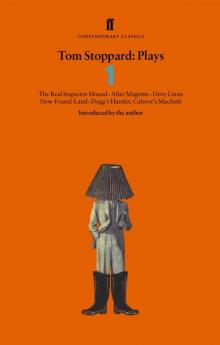 Tom Stoppard Plays 1
Tom Stoppard Plays 1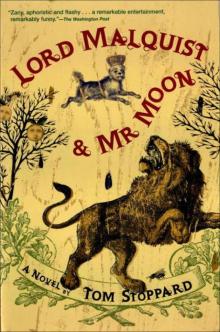 Lord Malquist & Mr. Moon: A Novel
Lord Malquist & Mr. Moon: A Novel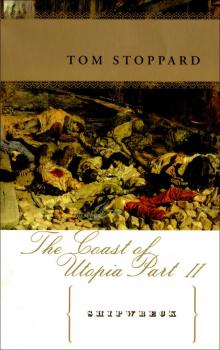 Shipwreck
Shipwreck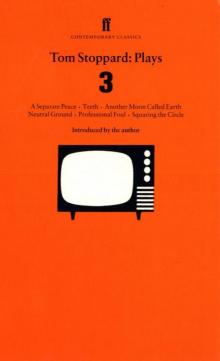 Tom Stoppard Plays 3
Tom Stoppard Plays 3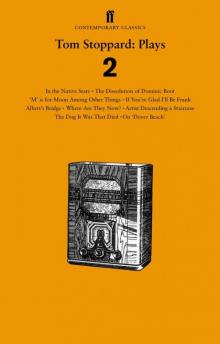 Tom Stoppard Plays 2
Tom Stoppard Plays 2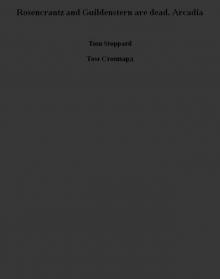 Rosencrantz and Guildenstern are dead. Arcadia
Rosencrantz and Guildenstern are dead. Arcadia